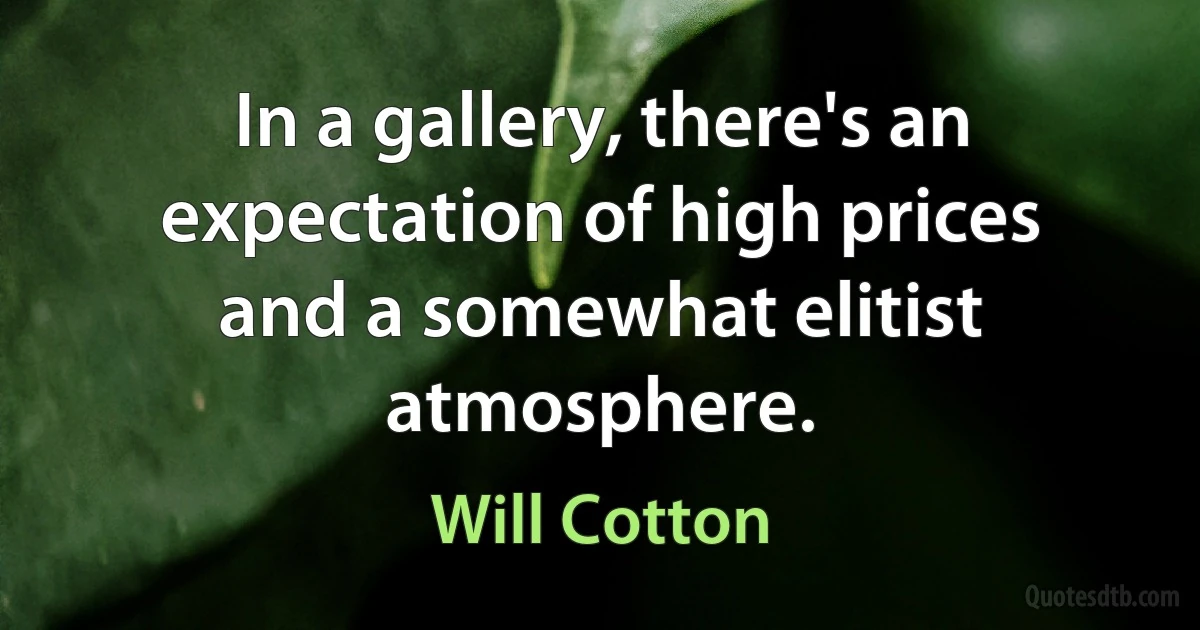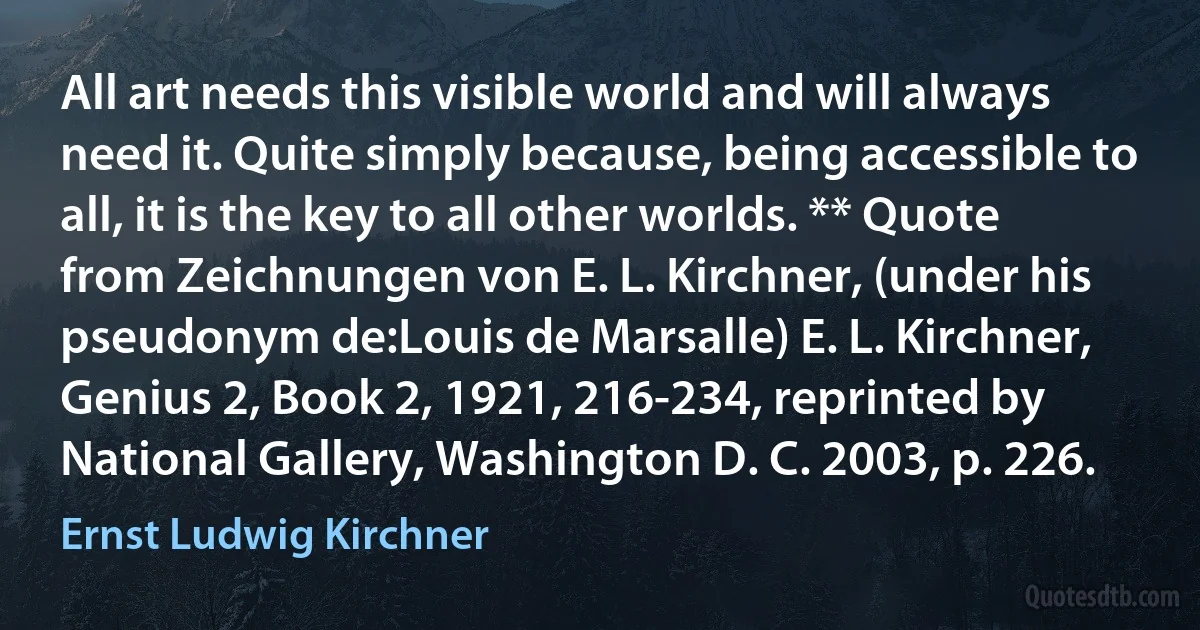Gallery Quotes - page 2
"A lot of people think that scuttling around stenciling images onto buildings in the middle of the night is the action of a sad, frustrated individual who can't get attention or recognition any other way. They might be right, but I've done gallery shows and, if you've been hitting on people with all sorts of images in all sorts of places, they're a real step backwards, painting the streets means becoming an actual part of the city. It's not a spectator sport." - Tristan Manco, Stencil Graffiti.

Banksy
Get all the information you can about the Cubists, and about Georges Braque and Pablo Picasso. Go to Kahnweilers' (Paris art gallery). And if he's got photos of recent works – produced after I have left -, buy one or two. Bring us [the Futurists in Italy, like Boccioni himself] back all the information you can get.

Umberto Boccioni
My first concert - apart from Beethoven at School and Erik Satie at the opening of my exhibition in Kleve in 1960 - was at the gallery Parnass in Wuppertal in 1963. Dressed like a regular pianist in dark grey flannel, black tie and no hat, I played the piano all over – not just the keys – with many pairs of old shoes until it disintegrated. My intention was neither destructive nor nihilistic. 'Heal like with like' – similia similibus curantur – in the homeopathic sense. The main intention was to indicate a new beginning.... or simply a revolutionary act. This was my first public Fluxus appearance.

Joseph Beuys
It is a special kind of secret how these Asiatic elements [of American Indians] came over the Bering Strait long ago. It's the same with the coyote. When I worked with the coyote [this quote refers to the performance by Beuys when he was locked up together with a coyote in a cage for a few days in René Block Gallery, New York City in 1974], I had the idea that it was not an indigenous animal. It came as a wolf with the Indians over the Bering Strait. And this Asiatic wolf, or step wolf, changed his whole biological configuration and behavior. Then it was my idea to import the coyote once more back to Europe, and you could see it [the coyote] change back to the European wolf or Siberian wolf. It is a transformed European wolf, the coyote, how it came to the character of a brush wolf.

Joseph Beuys
I had left the visible, physical blue at the door, outside, in the street. The real blue was inside, the blue of the profundity of space, the blue of my kingdom, of our kingdom!... the immaterialisation of blue, the coloured space that can not be seen but which we impregnate ourselves with... A space of blue sensibility within the frame of the white walls of the gallery.

Yves Klein
To get straight to the point, the local group of artist called Die Brücke would reckon it a high honour to be able to welcome you as a member. Of course you will know as little about Die Brücke as we knew about you before your ehibition at [Arnold's [gallery Arnold at Dresden. Now, one of the aims of Die Brücke is to attract all the revolutionary and fermenting elements to itself – that's the menaing of the name Brücke. The gruop also arranges several exhibitions a year, which it sends on tour in Germany... Now, dear Herr Nolde, think as you like and what you like, we hope this offer is the proper price for your tempests od colour.

Karl Schmidt-Rottluff
Just as the development of earth art and installation art stemmed from the idea of taking art out of the galleries, the basis of my involvement with public art is a continuation of wall drawings. As soon as one does work on walls, the idea of using the whole wall follows. It means that the art is intimately involved with the architecture. It is available to be seen by everyone. It avoids the preciousness of gallery or museum installations. Also, since art is a vehicle for the transmission of ideas through form, the reproduction of the form only reinforces the concept. It is the idea that is being reproduced. Anyone who understands the work of art owns it. We all own the Mona Lisa.

Sol LeWitt
I made my examination in Berlin in 1915. And I must say also that Berlin was for me in another way very important. At the time there were all these new movements – 'Die Brücke'...... the 'Der Blaue Reiter', Walden of the 'Storm' Gallery. Then Kassierer who bought the Chagalls, the first Chagall's that were ever seen in Europe were there. And there was 'Die Brücke'. Rottluff, Heckel, and Kirchner. You know we saw all that. Which was good. You see, Kassierer was then the man who bought the modern French painters. He had particularly Degas who I consider still today a very good painter, one of the best. But, anyway, in spite of my teaching my art was my concern. On the little money I had collected I lived in Berlin very cheaply, ate very cheaply. And already in 1920 I saved the first salaries I received to go to Munich... So for the first time I saw the old masters, Rubens and all at the Alte Pinakothek.

Josef Albers
His poor marksmanship must be taken into account. We have just won the most terrible war in history, yet here is a Frenchman who misses his target 6 out of 7 times at point-blank range. Of course, this fellow must be punished for the careless use of a dangerous weapon and for poor marksmanship. I suggest that he be locked up for eight years, with intensive training in a shooting gallery.

Georges Clemenceau
My friend returned to the gallery, looked once more at the adorable imprint of the most innocent, the most passionate of caresses. A mirror hung near by, where he could compare his present with his former face, the man he was with the man he had been. He never told me and I never asked what his feelings were at that moment. Did he feel that he was too culpable to have inspired a passion in a young girl whom he would have been a fool, almost a criminal, to marry? Did he comprehend that through his age which was so apparent, it was his youth which this child loved? Did he remember, with a keenness that was all too sad, that other, who had never given him a kiss like that at a time when he might have returned it? I only know that he left the same day, determined never again to see one whom he could no longer love as he had loved the other, with the hope, the purity, the soul of a man of twenty.

Paul Bourget
What foreigners like most about Britain is not multiculturalism or tolerance or any of that new Labour nonsense. No, what they like is our history. Shakespeare. Blenheim Palace. Soldiers in preposterous hats who don't move. Yes, they may go and see some dead dogs in a modern art gallery but that's only because they've spent the morning on top of a sightseeing bus and they're freezing.

Jeremy Clarkson
In 1987 a Civil Service inquiry decided that the pay of the Director of the Tate Gallery should match that of the Director of the much larger Victoria & Albert Museum and of the National Gallery, where the pictures were regarded as being much more important, because, and here I quote, "the Director of the Tate has to deal with the very difficult problem of modern art."

Nicholas Serota
In 1964 I was at school, planning to study economics and sociology, when curiosity took me to the Tate Gallery to see an international survey exhibition of contemporary art. It brought together the painting and sculpture of the previous decade, beginning with the late works of the modern masters, Matisse and Picasso, and concluding with the twenty-seven year olds Allen Jones and David Hockney. I was bowled over. Suddenly, art was not just Turner and Constable, or Leonardo and Michelangelo, but objects of considerable size and brilliant colour, dealing with the sensations, subjects and issues of the Sixties.

Nicholas Serota
My mind has been so much occupied these days by the thought of Cézanne, of how he has been one of the three or four powerful artists who have affected me like a thunderstorm, like some great event. Do you still remember what we saw at Vollard [art-seller in Paris who showed Cézanne's works frequently in his gallery] in 1900? And then, during the final days of my last stay in Paris, those truly astonishing early paintings of his at the Galerie Pellerin. Tell your husband he should see the things there... If it were not absolutely necessary [Paula was pregnant] for me to be here right now [Germany], nothing could keep me away from Paris.

Paula Modersohn-Becker
I saw my first Henry Darger collage/paintings in the early 1980's when the tale of Henry's life was just emerging through rumor and scattered fragments of his book. He lived and died a recluse in Chicago where no one knew of his writings or paintings. There was a folk art gallery in New Orleans that had acquired a small pile of Realms of the Unreal illustrations. I was on tour with REM at the time, Michael Stipe and I visited the gallery where we had a first look at these images of seven little horrified girls pursued by a purple and orange winged cats or evil professors on horseback or resting peacefully under giant sunflowers. I was completely captivated and intrigued.

Natalie Merchant
While the others had got married and moved out to suburbia, I had stayed in London and got into the arts scene through friends like Robert Fraser and Barry Miles and papers like The International Times. We opened the Indica gallery with John Dunbar, Peter Asher and people like that. I heard about people like John Cage, and that he'd just performed a piece of music called 4'33” (which is completely silent) during which if someone in the audience coughed he would say, ‘See?' Or someone would boo and he'd say, ‘See? It's not silence-it's music.' I was intrigued by all of that. So these things started to be part of my life. I was listening to Stockhausen; one piece was all little plink-plonks and interesting ideas. Perhaps our audience wouldn't mind a bit of change, we thought, and anyway, tough if they do! We only ever followed our own noses-most of the time, anyway. ‘Tomorrow Never Knows' was one example of developing an idea.

Paul McCartney



